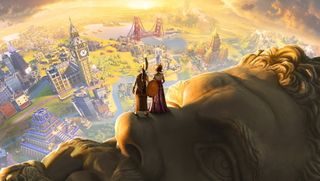Sid Meier says monetisation causes some games to 'stray a little bit further from the path'
"The real challenge and the real opportunity is keeping our focus on gameplay."

Sid Meier needs no introduction on PC Gamer, but let's whizz through a brief highlight reel: co-founder of Microprose and early simulation pioneer, one of the first developers to become a 'name' on the box with Sid Meier's Pirates!, then later founder of Firaxis and the driving force behind the Civilization series. Meier has been working in the industry since 1980 and over four decades later has an incredible living legacy: the guy knows what he's talking about. And right now, Sid Meier reckons the industry has gone down the wrong path on monetisation.
"The real challenge and the real opportunity is keeping our focus on gameplay," Meier told the BBC, in an interview discussing the Civilization series three decades on. "That is what is unique, special and appealing about games as a form of entertainment. When we forget that, and decide it's monetisation or other things that are not gameplay-focused, when we start to forget about making great games and start thinking about games as a vehicle or an opportunity for something else, that's when we stray a little bit further from the path."
It's hard not to relate Meier's words about games being a vehicle to the current and rather tiresome attempts to integrate NFTs, or convince everyone they're going to live in the metaverse.
Meier thinks that when it comes to stuff like this, some studios can't see past the dollar signs to the game they're making. "People can assume that a game is going to be fun and what it needs for success are more cinematics or monetisation or whatever—but if the core just is not there with good gameplay, then it won't work.
"In a sense gameplay is cheap... The game design part is critical and crucial but doesn't require a cast of thousands in the way some of the other aspects do. So it's perhaps easy to overlook how important the investment in game design and gameplay is."

Meier himself infamously has his own private engine, still based on his Civilization code, which he uses to prototype game concepts and show to Firaxis designers. Which is not to suggest he should be overly credited with Firaxis's games, which over the years have had hundreds of other peoples' talents involved, more that it suggests someone who's never lost focus on what matters about a game. Is the idea, in its most basic form, fun to play?
That's perhaps the element that risks getting lost when the focus is on microtransactions or digital ownership via the blockchain, and consumer apathy (and active dislike!) towards these technologies comes from the fact that no-one's made a compelling example of how these things can make games more fun in themselves.
PC Gamer Newsletter
Sign up to get the best content of the week, and great gaming deals, as picked by the editors.
The games industry is bigger than it's ever been: but that doesn't mean it's immune to trends, or chasing after faddy pots of gold. "There are lots of other ways that people can spend their leisure time..." warns Meier. "I think the way the internet works, once a shift starts to happen, then everybody runs to that side of the ship."
"I think we need to be sure that our games continue to be high quality and fun to play—there are so many forms of entertainment out there now. We're in a good position... but we need to be sure we realise how critical gameplay is—and how that is the engine that really keeps players happy, engaged and having fun."
Rich is a games journalist with 15 years' experience, beginning his career on Edge magazine before working for a wide range of outlets, including Ars Technica, Eurogamer, GamesRadar+, Gamespot, the Guardian, IGN, the New Statesman, Polygon, and Vice. He was the editor of Kotaku UK, the UK arm of Kotaku, for three years before joining PC Gamer. He is the author of a Brief History of Video Games, a full history of the medium, which the Midwest Book Review described as "[a] must-read for serious minded game historians and curious video game connoisseurs alike."
Most Popular






